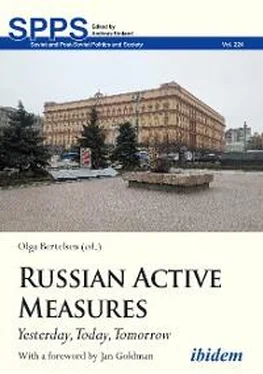Marcel H. Van Herpenis Director of the Cicero Foundation, a pro-EU and pro-Atlantic think tank (www.cicerofoundation.org). He is the author of Putin’s Propaganda Machine: Soft Power and Russian Foreign Policy (2016), Becoming Marx: How the Young Karl Marx Became a Marxist (2016), Putin’s Wars: The Rise of Russia’s New Imperialism (2014), and Putinism: The Slow Rise of a Radical Right Regime in Russia (2013). His personal website is www.marcelhvanherpen.com. He can be followed on Twitter: @MarcelHVanHerpe.
Nataliia Kasianenko is an Assistant Professor in the Department of Political Science at California State University, Fresno. Her research is focused on nationalism, legitimacy, and identity politics in the countries of the former Soviet Union. A native of Eastern Ukraine, Nataliia is currently working on several projects that incorporate social media data to analyze political trends in the occupied Donbas.
Martin Kraghis an Associate Professor (docent) at the Uppsala University Institute for Russian and Eurasian Studies. He holds a PhD from the Stockholm School of Economics (2009), and currently is Head of the Russia and Eurasia Program at the Swedish Institute of International Affairs. He is also a member of the board of the Sverker Åström Foundation and a former member of the board of directors of Transparency International Sweden (2012–2016).
Taras Kuziois a Professor in the Department of Political Science at the National University of Kyiv Mohyla Academy and a Non-Resident Fellow in the Foreign Policy Institute, the School of Advanced International Studies, Johns Hopkins University, Washington D.C. He is the author and editor of seventeen books, including (with Paul D’Anieri) The Sources of Russia’s Great Power Politics: Ukraine and the Challenge to the European Order (2018), Putin’s War Against Ukraine. Revolution, Nationalism, and Crime (2017, 2019), Ukraine. Democratization, Corruption and the New Russian Imperialism (2015), From Kuchmagate to Orange Revolution (2009), and Theoretical and Comparative Perspectives on Nationalism (2007), and the author of five think tank monographs, including The Crimea: Europe’s Next Flashpoint? (2010). Professor Kuzio is also a member of the editorial boards of Demokratizatsiya , Communist and Post-Communist Studies , and Eurasian Geography and Economics and has authored 38 book chapters and 100 scholarly articles on post-communist and Ukrainian politics, democratic transitions, color revolutions, nationalism, and European studies.
Victoria Malko is a faculty member and founding coordinator of the Holodomor Studies Program in the Department of History at California State University, Fresno. She is the author of The Chechen Wars: Responses in Russia and the United States (2015) and editor of Women and the Holodomor-Genocide: Victims, Survivors, Perpetrators (2019). She is also a member of the editorial board of American History and Politics.
Sergei I. Zhukis a Professor of History in the Department of History at Ball State University, U.S. A former Soviet expert in U.S. history, especially in the social and cultural history of colonial British America, Professor Zhuk moved to the United States in 1997, and defended his new (now American) Ph.D. thesis on imperial Russian history at Johns Hopkins University (2002). Since 1997, he taught American colonial history, Russian/Soviet and Ukrainian histories at the University of Pennsylvania, Johns Hopkins University, and Columbia University. His research interests include international relations, knowledge production, cultural consumption, religion, popular culture, and identity in imperial Russia, the Soviet Union, and Ukraine. He is a recipient of numerous research grants from the Kennan Institute at the Woodrow Wilson International Center for Scholars, the Rockefeller Foundation, the Bellagio Center in Italy, Fulbright, the Mellon Foundation, ACLS, IREX, and Petro Jacyk and Tymkiw Ukrainian Studies grants from the University of Toronto and the Harriman Institute, Columbia University. His publications include Soviet Americana: The Cultural History of Russian and Ukrainian Americanists (2018), Nikolai Bolkhovitinov and American Studies in the USSR: People’s Diplomacy in the Cold War (2017), Rock and Roll in the Rocket City: The West, Identity, and Ideology in Soviet Dniepropetrovsk, 1960–1985 (2010), and Russia’s Lost Reformation: Peasants, Millennialism and Radical Sects in Southern Russia and Ukraine, 1830–1917 (2004). Currently, he is writing a book entitled “The Seductive Adversary”: The KGB Operations against the USA and Canada in Soviet Ukraine, 1953–1991. He was invited as a Fulbright scholar to teach in 2021 in Estonia.
We live in perilous times as the information revolution bends its arc to backfire on democratic institutions. European countries that only in the last few decades have recaptured their freedom and independence after several generations either directly or indirectly under the control of the Soviet Union were partially liberated with the rise of fiber optic and digital information technology.
President Mikhail Gorbachev’s decision to loosen the Soviet bondage on Eastern Europe’s countries created the independence and democratic momentum that led to the collapse of the Berlin Wall in November 1989, and the overthrow of Communist rule throughout Eastern Europe. During this time, the unplanned but powerful interplay of bureaucratic interests and other institutional forces that operated in the Soviet Union made it difficult to foretell the close linkage between the information revolution and their citizens’ longing for freedom and democracy. It assumed that the information revolution would whet citizens’ appetites to taste self-independence. It was not long ago when the repressive regimes were frightened that “copy machines” would become accessible to ordinary citizens, allowing them to create their independent newspapers. State-sponsored propaganda for the masses was antithetical to the spreading of independent thought from its citizens. The once-powerful Communist-party bureaucrats would later ask at the cusp of the communication and cyber revolution that if Soviet society would produce samizdat (self-publication), can it also produce samoinformatizatsiia (self-informatization)? The upheaval in wireless communication was led by infrared, satellite, microwave transmissions, resulting in mobile phones and the ability to randomly assemble people using global positioning satellites.
Since then, the communist-led Soviet Union has been replaced with an authoritarian consumer-driven society directed by the corrupt Russian leadership. It was during that transformation that East European countries began their liberation and their conversion to independence. This led to the blossoming of information relying on modern and universally accessible telecommunication systems capable of supporting voice, data, and video information. Democratic values thrive on the free flow of information spreading throughout the world.
Unfortunately, today, the reignition of Russian expansion goals has led to an attack on those countries that are perceived as a threat to the inhabitants inside the Kremlin. The Russian government has learned that a government can inhibit information in a democratic society, and while it cannot completely shut it off, it can stunt its growth or prevent it from spreading. Rather than guns, troops, and tanks, Russia uses social media and the growing availability of software bots and other tools for manipulating video and other online content to conduct broad disinformation campaigns.
Читать дальше












